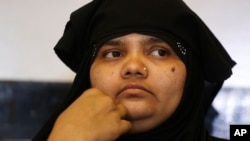A move by India's top court to order record compensation for a Muslim woman gang raped during religious riots more than 15 years ago could help other victims win justice, her lawyer and activists said on Wednesday.
Bilkis Bano was three months pregnant when she was gang raped and her three-year-old daughter was murdered during the violence that swept the western state of Gujarat state in 2002, killing more than 1,000 people.
On Tuesday, the Supreme Court ordered the Gujarat government to compensate Bano with 5 million rupees ($71,582), a job and a home after she rejected an offer of 500,000 rupees in March.
"This is a case where the maximum compensation has been granted by any Indian court for rape or communal violence," said Shobha Gupta, Bano's lawyer, describing the judgment as "historic" at a press conference.
The cash compensation is nearly five times more than the 1.3 million rupees granted to a victim in northeast India in a 2017 case - the next highest amount, according to Gupta.
"When such kind of orders are passed, yes, you have a ray of hope," said Gupta. "There is a message that goes out that 'yes, there are courts still existing and justice can still prevail'."
Last year, the Supreme Court approved a scheme that guarantees survivors of sexual assault compensation of up to 1 million rupees, saying such aid was crucial for their care and rehabilitation.
Conservative attitudes in India mean victims of sexual assault are often shunned by their families and communities, and blamed for the violence perpetrated against them, say activists and lawyers.
Many are ostracized from their homes and cannot afford the legal fees to fight for justice in an under-resourced judicial system where verdicts can take years to reach.
India strengthened its laws on sexual assault after the fatal gang rape of a student in New Delhi in 2012 sparked nationwide protests.
Yet women brave enough to go to the authorities still face numerous challenges, from hostile police, faulty medical and forensic examinations to shoddy investigations and weak prosecutions.
"It continues to be a huge struggle for women to get justice in our country," said Malini Ghose, a women's rights activist. "But we hope that this (judgment) makes the journey easier for all those other women ... for thousands of other women who are knocking on the doors of justice."
Bano said her fight for justice had been long and nightmarish, and that she wanted to use some of the money to "help other sisters like me in their journeys to justice".
She said she would dedicate her efforts to her murdered daughter Saleha, who "was lost in the tide of hatred".
"That has haunted me in ways I can never express," said Bano as she and her husband wiped away tears. "But ... through helping others, she will live on in the lives of other children."





